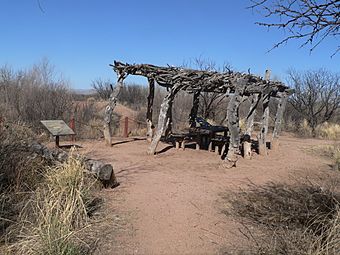Murray Springs Clovis Site facts for kids
Quick facts for kids |
|
|
Murray Springs Clovis Site
|
|

Ramada on interpretive trail
|
|
| Nearest city | Sierra Vista, Arizona |
|---|---|
| Website | Murray Springs Clovis Site |
| NRHP reference No. | 12001019 |
| Designated NHL | 2012 |
The Murray Springs site is a really old place in southern Arizona. It's close to the San Pedro River. About 11,000 years ago, it was a hunting camp for people from the Clovis culture.
This site is special because archaeologists found tons of bones from huge, ancient animals. They also found many tools used for hunting and preparing these animals. Scientists have found five spots where animals were killed and prepared. They also found a main camp area where the Clovis people lived. Today, the Bureau of Land Management takes care of the site. It's part of the San Pedro Riparian National Conservation Area.
Discovering Murray Springs
In 1966, two archaeologists, C. Vance Haynes and Peter Mehringer, found the Murray Springs site. They were from the University of Arizona. They were mapping the area around another famous site, the Lehner Mammoth Kill Site.
That day, they found two big piles of mammoth bones. They thought it was a Clovis site right away. This was because of the bones and because the ground looked just like the Lehner site. Money from the National Science Foundation and the National Geographic Society helped them dig there from 1967 to 1971.
What Archaeologists Found
During the digs, archaeologists found many important things. They found old fireplaces, a bone tool, and sharp projectile points. These points were probably used on spears. They also found many stone tools and small pieces of stone called debitage. Debitage is what's left over when people make stone tools.
The five animal kill sites had bones from mammoths, bison, horses, camels, and even ancient dogs and rodents. One worker found a piece of a clay pot on the surface. This pot piece was from much later, around 1300 to 1450 CE. This shows that people used the spring for a very long time.
Clovis Sites in Arizona
The San Pedro River Valley is famous for its many Clovis culture sites. There are almost a dozen Clovis sites within 50 miles of Murray Springs. Some of these include the Lehner Mammoth Kill Site, the Naco Mammoth Kill Site, the Escapule Clovis Site, and the Leikem Clovis Site.
The Department of the Interior and the Bureau of Land Management look after Murray Springs. In 2012, the U.S. Government named it a National Historic Landmark. This means it's a very important historical place. You can visit the site, which has a parking area and a special trail to learn more.


